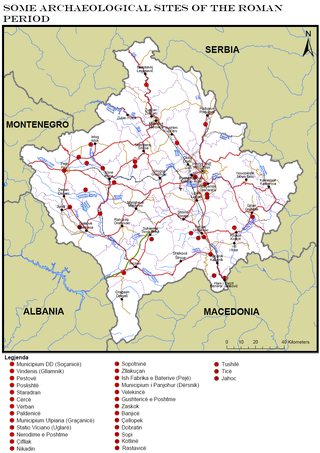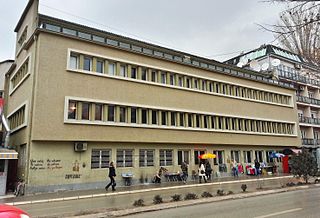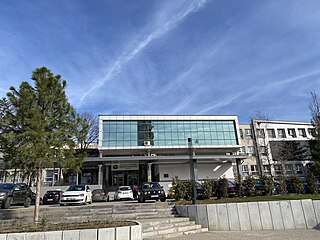Related Research Articles

Archaeology of Kosovo as a field of study and research was started in the second half of the 20th century. Kosovo's field of archaeology has developed in tandem with the historical study, studies of ancient authors' sources, classic philological studies, theological data research, topographic studies and ground survey, analysis of toponyms, deciphering of epigraphic and historiographic data. First data about antique monuments in Kosovo, were documented from the end of the 19th until the beginning of the Second World War, a time period when Kosovo was visited by researchers, guides, and archaeologists such as: Evans, Boue, Hahn, Kanitz, Tomaschek, Domaschevski, Arpad, Vulic, Jirecek, Patsch, Domenico Mustilli, etc.

The Roman heritage sites in Kosovo represent a multitude of monuments of material and spiritual culture, which reflect the Roman period in this region. Among them, a special place is occupied by those that represent the development of art, such as the plastic monuments that are more frequent, and at the same time occupy an important place, because with the presentation of figures in relief and with numerous inscriptions they speak to us enough for this period.

The Faculty of Arts of Pristina is the faculty of arts of the University of Pristina, located in Pristina, Kosovo.

The National Institute of Public Health of Kosova (NIPHK) is the oldest and highest health, professional and scientific institution of Kosovo, which organizes, develops, supervises and implements public health policies in Kosovo. The NIPHK covers the entire territory of the Republic of Kosovo through its branches - Public Health Institutes (IPH) organized in these Regional Centers: Peja, Prizren, Mitrovica, Gjilan, Gjakova, Ferizaj.
Pajazit Nushi was a university professor, psychologist and scientific and social-political worker from Gjakova, Kosova. Member of the Academy of Sciences and Arts of Kosovo.
Zef Mirdita was an Albanian historian, university professor and academic from Prizren, Kosovo. He has made a significant contribution to the fields of Illyrology and Balkan studies.
The History of education in Albania is a crucial component of the cultural, civilizational, and educational thought of the Albanian populace at large. While authentic scientific inquiry into the history of education and Albanian educational philosophy emerged comparatively late, Albanian researchers have made noteworthy contributions. Studies and monographs conducted by these scholars, particularly those undertaken in the latter half of the 20th century through the early 21st century, have illuminated a range of facets pertaining to this subject.
Shefik Osmani was an Albanian pedagogist, scholar, researcher, and educational theorist.

The Faculty of Philology is an academic unit within the University of Pristina. Established in 1988 after gaining independence from the Faculty of Philosophy, its roots can be traced back to the Higher Pedagogical School of Prishtina (1958) and the Faculty of Philosophy (1960).
The Higher Pedagogical School of Prishtina established in 1958, has been the first institution of modern higher education in Kosovo and a precursor to the University of Prishtina.
Xheladin Murati is an educator, university professor, and former deputy in the Parliament of North Macedonia.
Islam Krasniqi is a Kosovan didactician, educational theorist, and university professor.
Musa Kraja was a notable figure in Albanian education. He was an educator, doctor of pedagogical sciences, university professor, and an author of pedagogical works and biographical monographs. His contributions were recognized with the title of "Distinguished Teacher".

The University of Gjakova "Fehmi Agani" - UGJFA is a public university located in Gjakova, Kosovo. It was originally established as a Higher Pedagogical School in 1967 and has since grown into a comprehensive university.

The University of Gjilan also known as University of Gjilan "Kadri Zeka" - UGJKZ is a public university located in Gjilan, Kosovo. It was originally established as a Pedagogical Academy in 1973 and has since grown into a modern university.

The University Clinical Center of Kosovo (UCCK) (Albanian: Qendra Klinike Universitare e Kosovës; QKUK) is the largest and most prominent medical institution in Kosovo, located in Prishtina, the capital city. The UCCK provides a wide range of medical services, including specialized treatments and surgeries, and plays a crucial role in healthcare delivery and medical education within Kosovo.
Hajrullah Koliqi (1946) is an Albanian educator, lecturer and university professor from Montenegro.
Afërdita Deva-Zuna is a university professor, researcher in the field of family pedagogy, and author of pedagogical works and studies. She made significant contributions to the development of pedagogical thought in Kosovo.
The Prishtina Normal School was a teachers' college in Kosovo, established on 17 December 1941, during the Italian occupation of Kosovo. It was a cornerstone in the development of the educational system in Kosovo and in the region. Initially created to address the critical need for qualified teachers in Kosovo's Albanian schools, the institution quickly became a vital academic, educational and cultural hub. Over the years, it played a significant role in training educators and fostering intellectual growth, leaving a lasting legacy through its distinguished alumni and contributions to Kosovo's educational system. Between 1946 and 1953, the school operated in Gjakova. The Prishtina Normal School ceased to exist in 1974.

The Faculty of Law of the University of Prishtina, established in 1961, is a key institution for legal education in Kosovo. It offers a comprehensive curriculum with undergraduate (LL.B) and postgraduate programs, covering various legal fields such as civil, criminal, constitutional, and international law.
References
- ↑ Kraja, Mehmet, ed. (2018). "Fjalori Enciklopedik i Kosovës". (Encyclopedic Dictionary of Kosova) (in Albanian). Vol. 1. Prishtina: Academy of Sciences and Arts of Kosova (Akademia e Shkencave dhe e Arteve e Kosovës). p. 683. ISBN 9789951615846. OCLC 1080379844.
- ↑ "Instituti Pedagogjik i Kosovës mbajti simpoziumin me temë "Integrimi i artit në edukim"". Telegrafi (in Albanian). 2024-06-05. Retrieved 2024-07-16.
- ↑ "Kërkime Pedagogjike". albanica.al (in Albanian). Retrieved 2024-07-16.
- ↑ Koliqi, Hajrullah (2022). Fjalor enciklopedik i edukimit [Encyclopedic Dictionary of Education] (in Albanian). Vol. 1. Universiteti i Prishtinës. p. 633. Retrieved 2024-05-09– via botimpex.com.
